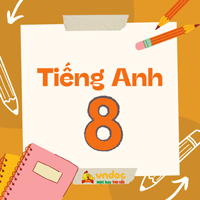Ngữ pháp Unit 5 lớp 8 Festivals in Viet Nam
Tài liệu Ngữ pháp tiếng Anh Unit 5 lớp 8 Festivals in Viet Nam dưới đây nằm trong seri tài liệu Soạn tiếng Anh lớp 8 mới theo từng Unit mới nhất năm học 2022 - 2023 trên VnDoc.com. Ngữ pháp tiếng Anh 8 Unit 5 bao gồm 3 chuyên đề ngữ pháp chính: Câu đơn, Câu ghép và Câu phức trong tiếng Anh.
Ngữ pháp tiếng Anh lớp 8 Unit 5 Festivals in Viet Nam
I. Câu đơn - Simple sentence
- Là câu chỉ có một mệnh đề độc lập.
Ex: Trang plays the piano. Trang chơi đàn piano.
- Câu đơn không phải là câu ngắn mà nó chỉ thể hiện một ý chính.
Ex: There are my books. Đây là những quyển sách của tôi.
- Một câu đơn có thể có nhiều hơn một chủ ngữ.
Ex: Nam and Khang are playing football.
Nam và Khang đang chơi bóng đá.
- Một câu đơn có thể có nhiều động từ.
Ex: Trang ate peanuts and drank coffee.
Trang đã ăn đậu phộng và uống cà phè.
II. Câu ghép - Compound sentences
- Là câu chứa từ hai mệnh đề độc lập trở lên, diễn tả các ý chính có tầm quan trọng ngang nhau.
- Chúng ta sử dụng các cách sau để nối hai mệnh đề:
2.1. sử dụng dấu chấm phẩy (;)
Ex: I met David yesterday; he’s just come out of hospital.
Hôm qua tôi gặp David; anh ta vừa ra khỏi bệnh viện.
2.2. sử dụng dấu phẩy (,) và một liên từ đẳng lập (and, but, so, yet)
Ex: The bus was very crowded, so I had to stand all the way.
Xe buýt rất đông người vì vậy tôi đã đứng suốt đoạn đường.
He loves her, but she doesn’t love him.
Anh ấy yêu cô ấy nhưng cô ấy thì không.
2.3. sử dụng dấu chấm phẩy (;) và một trạng từ nối tiếp — từ chuyển tiếp
(however, therefore, nevertheless, moreover, otherwise,...) và theo sau đó là dấu phẩy (,).
Ex: The bus was very crowded; therefore, I had to stand all the way.
Xe buýt rất đông người vì thế tôi đã đứng suốt đoạn đường.
III. Câu phức - Complex sentence
- Là câu chứa một mệnh đề độc lập và một hay nhiều mệnh đề phụ thuộc. Mệnh đề phụ thuộc có thể bắt đầu bằng liên từ phụ thuộc hoặc đại quan hệ (như when, while, because, although/even though hoặc if Nếu mệnh đề phụ thuộc đứng trước mệnh đề độc lập thì trước mệnh đề độc lập phải có dấu phẩy (,).
Ex: Because the bus was crowded, I had to stand all the way. (Bởi vì xe buýt rất đông người, tôi đã đứng suốt đoạn đường.
Trong câu trên có một mệnh đề độc lập - “I had to stand all the way”, “people cheer to encourage them” và một mệnh đề phụ thuộc “the bus was crowded”, “the elephants are racing”.
Còn nếu mệnh đề độc lập đứng trước mệnh đề phụ thuộc thì trước mệnh đề phụ thuộc không có dấu phẩy (,).
- Câu phức sử dụng liên từ phụ thuộc (after, although, as, because, before, how, if, once, since, than, that, though, till, until, when, where, whether, while,...) để nối các vế của câu.
Ex: We left before he arrived. (Chúng ta đã rời khỏi trước khi cậu ấy đến.)
IV. Bài tập ngữ pháp unit 5 lớp 8 Festivals in Vietnam
Choose the best answer.
1. You should ________ information about a custom or tradition.
A. finds
B. found
C. finding
D. find
2. A custom is something that has become an ________ way of doing things.
A. to be accept
B. to accept
C. accepting
D. accepted
3. In the UK, there are lots of customs for table manners. For example, we ________ use a knife and fork at dinner.
A. have to
B. are having
C. has to
D. having to
4. In Viet Nam, you ________ use only the first name to address people older than you.
A. should
B. must
C. shouldn’t
D. have to
5. At the Mid-Autumn Festival, kids can sing, dance, and enjoy moon-cakes. ________ , every child likes it very much.
A. However
B. Moreover
C. Because
D. Therefore
6. In 2010, Ha Noi ________ its 1000th anniversary.
A. celebrated
B. commemorated
C. worshipped
D. remembered
7. Tet is an occasion for ________ family in Viet Nam.
A. visitings
B. meeting
C. reunions
D. seeings
8. ________ spring comes, many Vietnamese villages prepare for a new festival season.
A. While
B. When
C. Nevertheless
D. However
9. The flight ________ at 6.10 has been delayed.
A. leave
B. which leaves
C. leaving
D. B&C
10. This is the first time she ________ rice paddies.
A. will see
B. sees
C. has seen
D. saw
11. Would you mind ________ I borrowed your dictionary?
A. if
B. when
C. that
D. Ø
12. We ________ lots of photos on vacation last summer.
A. had
B. took
C. did
D. made
13. The animal ________ in the forest fire was a wild pig.
A. hurt
B. hurted
C. hurts
D. hurting
14. Would you mind ________ the window?
A. to close
B. closing
C. about closing
D. closed
15. Welcome ________ Springfield!
A. at
B. to
C. in
D. for
Give the correct form of the following verbs
1. My mother always tells me that I have to ________ home by 9 p.m. (be)
2. When I came, the whole family _________ dinner around a big dinning table. (have)
3. Children should ________ things from adults with both hands. (take)
4. In Australia, you mustn’t ___________ on a person’s accent. (comment)
5. Laura lives in a big city. If she (live) ______ in the country, she (have) _______ a dog.
6. I (learn) _________ Italian for the past three years.
7. If I were you, I (not / buy) _________ that book.
8. What________ the children (see)________ in the zoo yesterday?
9. They prefer (play) ________in a swimming pool all day.
10. The doctor will be ready in ten minutes. Take a seat while you ________. (wait)
ĐÁP ÁN
Choose the best answer.
1 - B; 2 - D; 3 - A; 4 - C; 5 - D;
6 - A; 7 - C; 8 - B; 9 - D; 10 - C;
11 - A; 12 - B; 13 - A; 14 - B; 15 - B;
Give the correct form of the following verbs
1. My mother always tells me that I have to ____be____ home by 9 p.m. (be)
2. When I came, the whole family ____was having_____ dinner around a big dinning table. (have)
3. Children should ____take____ things from adults with both hands. (take)
4. In Australia, you mustn’t ______comment_____ on a person’s accent. (comment)
5. Laura lives in a big city. If she (live) __lived____ in the country, she (have) ____would have___ a dog.
6. I (learn) ___have learned______ Italian for the past three years.
7. If I were you, I (not / buy) _____would not buy____ that book.
8. What____did____ the children (see)____see____ in the zoo yesterday?
9. They prefer (play) ____playing/ to play____in a swimming pool all day.
10. The doctor will be ready in ten minutes. Take a seat while you ____are waiting____. (wait)
Trên đây là Ngữ pháp Unit 5 SGK tiếng Anh lớp 8 mới chi tiết nhất. Mời bạn đọc xem thêm nhiều tài liệu ôn tập Ngữ pháp Tiếng Anh cơ bản, Từ vựng Tiếng Anh lớp 8 tại đây: Bài tập Tiếng Anh lớp 8 theo từng Unit năm học 2022 - 2023. Chúc các em học sinh lớp 8 học tập hiệu quả.
Bên cạnh việc tương tác với VnDoc qua fanpage VnDoc.com, mời bạn đọc tham gia nhóm học tập tiếng Anh lớp 8 cũng như tiếng Anh lớp 6 - 7 - 9 tại group trên facebook: Tiếng Anh THCS.









